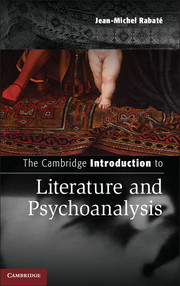Book contents
- Frontmatter
- Contents
- Acknowledgments
- Introduction
- Chapter 1 Freud’s theater of the unconscious
- Chapter 2 Literature and fantasy, toward a grammar of the subject
- Chapter 3 From the uncanny to the unhomely
- Chapter 4 Psychoanalysis and the paranoid critique of pure literature
- Chapter 5 The literary phallus, from Poe to Gide
- Chapter 6 A thing of beauty is a Freud forever
- Chapter 7 From the history of perversion to the trauma of history
- Conclusion
- Keywords and Index of Authors
- Bibliography
- Index
- References
Chapter 1 - Freud’s theater of the unconscious
Oedipus, Hamlet, and “Hamlet”
Published online by Cambridge University Press: 05 September 2014
- Frontmatter
- Contents
- Acknowledgments
- Introduction
- Chapter 1 Freud’s theater of the unconscious
- Chapter 2 Literature and fantasy, toward a grammar of the subject
- Chapter 3 From the uncanny to the unhomely
- Chapter 4 Psychoanalysis and the paranoid critique of pure literature
- Chapter 5 The literary phallus, from Poe to Gide
- Chapter 6 A thing of beauty is a Freud forever
- Chapter 7 From the history of perversion to the trauma of history
- Conclusion
- Keywords and Index of Authors
- Bibliography
- Index
- References
Summary
Let us begin our rereading process with a few of Freud’s “ten best books ever.” Two on this list are by Shakespeare. Freud, who read and spoke English fluently, had a lifelong passion for Shakespeare. He quotes more than twenty plays in his various works, often from memory, which over time produced a number of revealing slips. One could even assert that Shakespeare became Freud’s guide on the path of discovering a cultural unconscious. Freud felt that he was Shakespeare’s contemporary – at a certain distance from the classical theater of the Greeks and not fully attuned to the work of the Viennese avant-garde. Already at the age of seventeen, he could pun on a line from Twelfth Night I, 1, in a letter to Eduard Silberstein: “‘Frances is the key to the heart,’ you say, adapting Shakespeare, who said the same of music. ‘Young ladies are boring, ergo they are cure for boredom, poison being the best antidote’” (LSFES, p. 40). Here, “Frances” means the French language, and Silberstein and Freud outplay each other in the conceit that an excess of love will cure this disease by surfeit.
Freud and Hamlet
Then, in an important letter to his friend Fliess dated September 21, 1897, Freud suggested that he had wholly identified with Hamlet. This was the same letter in which he announced that he rejected his previous theory of neuroses; it was based on the idea that the perversion of the fathers – that is, their sexual seduction – would produce or precipitate the hysterical symptoms of the daughters. As we have seen, he had already changed his mind about this seduction theory during Dora’s treatment. In 1897, Freud realized that most of these accusations were fantasy-based delusions. Yet, in the context of his letter, accounting for his decision to take a new departure, he slightly misquoted Hamlet. Hamlet had said, “The readiness is all,” but Freud writes, “To be in readiness.” Freud was aware of having produced a “variation” on the hero’s famous words; a deeper identification is nevertheless obvious. Like Hamlet, Freud is full of doubts; the rosy picture of a future leading to “eternal fame” brought by scientific discoveries has faded away. Freud is like Hamlet in that he has to question the very root of desire and to find that desire is founded purely on “psychological” determinations.
- Type
- Chapter
- Information
- Publisher: Cambridge University PressPrint publication year: 2014

